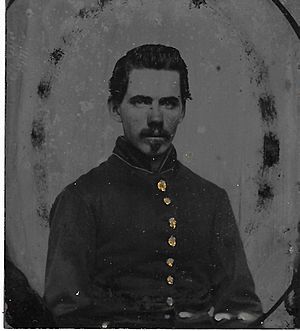William G. Whitney facts for kids
Quick facts for kids
William Garrett Whitney
|
|
|---|---|
 |
|
| Born | December 13, 1840 Allen, Michigan |
| Died | May 7, 1915 (aged 74) Allen, Michigan |
| Buried |
Allen, Michigan
|
| Allegiance | |
| Service/ |
|
| Years of service | 1861-1865 |
| Rank | Captain |
| Unit | |
| Battles/wars | American Civil War |
| Awards | |
William Garrett Whitney was a brave American soldier. He lived from 1840 to 1915. He fought in the American Civil War for the Union Army. He earned the Medal of Honor, which is the highest award for bravery a soldier can receive. He got this award for his actions during the Battle of Chickamauga.
William Whitney joined the army on August 24, 1861. He was 21 years old and from Allen, Michigan. He served as a sergeant in Company B of the 11th Michigan Infantry. Before joining the army, he was a student at Hillsdale College. This college was known for supporting the end of slavery. Famous speaker Frederick Douglass even visited and spoke there in 1863.
Whitney was promoted three times during his service. He became a second lieutenant in 1863. Then, he was promoted to first lieutenant in 1864. Finally, he became a captain in 1865. He finished his military service on September 16, 1865, in Nashville.
Life and Family
William Whitney was born on December 13, 1840. His hometown was Allen, Michigan, in Hillsdale County, Michigan. He passed away in Allen on May 7, 1915. He is buried in the Allen Cemetery.
In 1874, he married Elizabeth Hyland Marshall. She lived longer than him. They had four children together, including a son named Frederic.
Medal of Honor Story
Whitney received the Medal of Honor in 1895. This special award was for his incredible bravery. It happened on September 20, 1863, during the Battle of Chickamauga in Georgia. He was one of four students from Hillsdale College to earn this medal during the Civil War. He was also one of nine Union soldiers honored for their actions at Chickamauga.
In a book called Deeds of Valor, Whitney shared his story. His unit was fighting on Snodgrass Hill. They were defending against many attacks from the Confederate army. They built a small wall of stones and logs for protection.
After fighting for hours, they ran out of ammunition. The enemy was very close, getting ready for another attack. Their sharpshooters were aiming at anyone who showed their head. Dead and wounded soldiers were lying everywhere near their defenses.
Whitney didn't know why, but he felt he had to act. He took out his knife and climbed over their protective wall. While his company cheered him on, and the enemy shot at him, he quickly moved along the front line. He cut off the cartridge boxes from the dead and wounded soldiers. He then threw these boxes back to his company.
This brave act gave his men a few more rounds of ammunition. The enemy attacked one more time, but Whitney's unit pushed them back again. Darkness finally ended the terrible battle of Chickamauga.
See also

